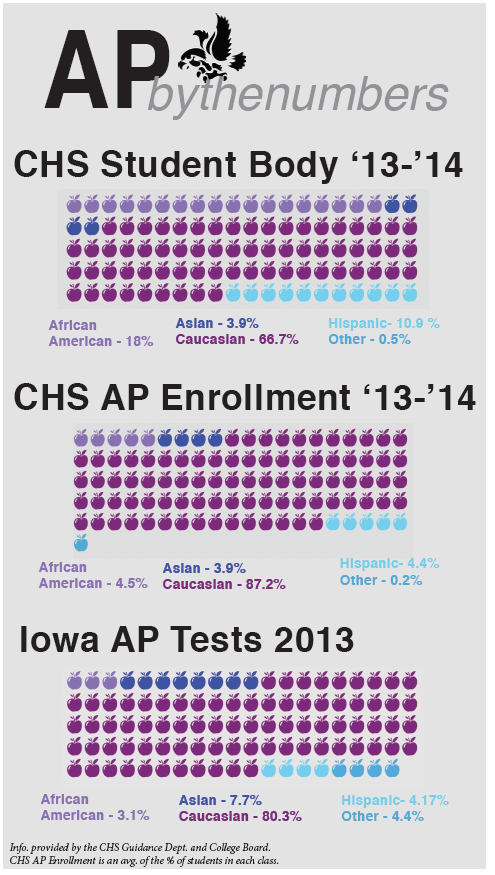The AP Achievement Gap
School administration has acknowledged and is working to address the underrepresentation of minority students in AP classes. The solution will likely require changes at both the school and district level.

Jenny Flores’s mom didn’t know what an Advanced Placement (AP) class was until her daughter decided to take two her senior year. Flores is the only Hispanic student in her section of AP Statistics and AP Psychology but decided to take the classes to prepare for college.
“I used to think that average was good enough, but now I’m thinking I should go beyond what I thought I could do,” Flores ‘14 said. “My mom is proud of me. I think it’s something I can do, to do better than my parents are doing right now. I don’t think they are satisfied with what they are doing right now.”
Flores is the exception to a trend of minority student underrepresentation in AP classes at City High. The school is offering 20 AP classes this year.
Advanced Placement classes offer college-level curriculum to students. If a student earns a qualifying score on an AP exam – typically a 4 or 5 score out of 5 – they may receive college credit.
AP classes are also commonly used as a tool to rank high schools. In Newsweek magazine’s “America’s Best High Schools” rankings, AP tests taken per student accounts for 25 percent of a school’s score, and average AP scores account for 10 percent. Addditionally, percent of students enrolled in at least one AP class contributes five percent to the ranking score. In the 2013 ranking, City High is 997.
In AP offerings at City High overall, minorities have far less representation than in the general population of the school. School administration has acknowledged this and knows that more could be done to encourage minority and low-income participation in these classes.
“I think we probably need to set some goals and be more aggressive, to have our statistics be more reflective of our student body,” Principal John Bacon said. “We have to target our efforts better.”
Bacon emphasized that encouraging students to try an AP class can improve not only the individual student’s learning but the academic achievement of the school as a whole.
Kiera Washpun ‘14 has never taken an AP class and does not plan on doing so.
“No one has ever pushed me to take an AP class,” Washpun said. “I wouldn’t think to myself, ‘Oh, I should take an AP class.’”
One way Bacon thinks that the school can raise numbers of students in AP classes is by working with teachers of freshman classes to find, prepare and encourage students who may be successful in higher-level classes.
“The school focuses more on lower achieving kids than the higher achieving ones,” Omar Shaban ‘14 said. “I mean that they try to help lower kids catch up to the middle. But they aren’t helping middle kids get to the top.” Shaban has taken seven AP classes in the past four years.
Of the factors that could prevent minority students from taking advantage of AP classes at City, socio-economic status is likely to play a key role. According to Professor David Bill, a professor of sociology and Associate Dean at the College of Education at the University of Iowa, the achievement gap between minority and majority students has narrowed in recent history. However, the socio-economic gap has widened.
“Part of what you’re seeing when you see a racial or ethnic gap is really a class gap, because for the most part minority kids are still more likely to be from lower-income homes than majority kids.” Bills said.
The achievement gap is not only related to race.
“One thing I find really interesting is when people say an achievement divide, they often think just solely of racial achievement, but it is not,” said Ryan Wise, Deputy Director of the Iowa Department of Education. “Once you factor in English Language Learners (ELL), students with disabilities, and socio-economic status, the achievement divide largely disappears”
In fact, the new ICCSD diversity policy defines minority students as those receiving free or reduced price lunches. It does not mention race.
This year City has added four new AP class offerings in an effort to get students to challenge themselves in a subject area where they have an interest. One indication of positive progress is the new AP Language and Composition class, in which minority representation is comparable to the school’s minority populations.
“Maybe people don’t see the relevance of AP English, or they are not going to be studying Literature in college, therefore, why would they take an AP class in it?” Robyn Fields, AP Language & Composition teacher said. “Whereas in AP language most of what we do is going to get kids ready for college. It’s reading non-fiction and writing in a style that they would use in college.”
However, simply adding more AP classes seems unlikely to solve the underlying problem. Bills says that parents who have been to college themselves have a better idea of how schools are set up. They are also better prepared to navigate their children through course selections.
“Parents who already have advantages see more AP offerings as a way to secure a little more advantage,” Bills said. “It’s not that anybody is deliberately keeping kids down, but in the process of trying to maximize the chances for their own kids it just sort of widens the gap a little bit more.”
For example, Shaban says that his parents are the ones who pushed him and told him to challenge himself.
“I have to get good grades,” he said. “They push me to do better and they are the reason that I take more challenging classes. I feel like I wouldn’t push myself as hard if I didn’t want to, but they are helping me out.”
That parental support can play a key role in student success.
“Some of it depends on how much support [students] are getting at home,” said Fields. “There are so many factors that make it challenging.”
Some parents do not put push their kids to succeed academically because they do not have enough information about the curriculum the school offers. Bills doesn’t believe that this has anything to do with how much a parent cares about their child. He points to issues like parents who may have to work long or alternative shifts, or have many kids to take care of, as part of the reason it is hard for the school to reach parents.
The school offers a PSTO meeting about registration, and there is a parent meeting for parents of freshmen to learn about curriculum each year before school begins.
Other factors that play a role in which classes a student signs up for include their peer group. Ty Williams ’14, took AP Government last year. She said that only one of her friends was also in any AP classes.
“They don’t want to seem too smart, because their friends will bully them because they are in AP classes,” Williams said. “People will make fun of me about it, but at the end of the day it’s about me getting into college.”
Flores believes that people she knows also opt out of AP for superficial reasons.
“Some people think we are stereotyped so they don’t take the class. They think well ‘Hey, they think I’m dumb, might as well play dumb,” Flores said. “That’s something that I don’t think is a good idea. I try not to play dumb.”
School and district administration believe that this negative culture can be reversed.
“The school certainly has a role and obligation to nurture that culture of interest in education and higher education, and parents do too,” Ross Wilburn, ICCSD Equity Director, said.
The idea is that having someone to help students take a risk can help them succeed.
“To be the first to break down certain barriers, to take a risk, take a chance – yeah, that can be hard,” Bacon said. “That’s why I think it helps when you have someone who shows you, ‘Hey, I believe in you. I’m reaching out to you.’”
Making sure that students are excited about their education needs to start before high school. If that happens, then Wilburn believes that students may be more likely to challenge themselves in high school.
“If schools, parents and students themselves wait to get involved or build that interest until high school then it would be a huge challenge,” Wilburn said. “We need to build the foundation earlier so there is a greater opportunity for it to happen in high school.”
However, Bacon isn’t about to hand off the challenge to families, elementary school staff, or the district. He thinks that by setting goals and beginning a discussion amongst City staff and students, change can be made.
“I need to play a more active role in addressing this at the systemic level,” Bacon said.
He also plans on taking steps within City to increase diversity in all classes.
“I am going to take this data and put it in the hands of the entire faculty and say that seeking to increase the minority population of students taking AP classes should be a goal in every single one of these classes,” Bacon said. “I think in many cases reaching out to students and showing them that we believe in them can help break down that barrier and get some pioneers to come in and take their first AP class. Maybe that will lead to taking more.”
For Flores the experience of being in AP classes has inspired her to play a role in her younger siblings’ education.
“They are smart,” she said. “Hopefully, I can help them go beyond what they know and make them be better.”
Your donation will support the student journalists of Iowa City High School. For 2023, we are trying to update our video and photo studio, purchase new cameras and attend journalism conferences.

Who am I and why am I here?... No one knows...This is my first and last year on staff. I'm a reporter who writes stories sometimes about politics, sometimes...

Being a Co-Executive Editor of The Little Hawk means having the chance to work with the legendary Jacob 'Jay-Z' Potash. Jacob contributes monotone...






























